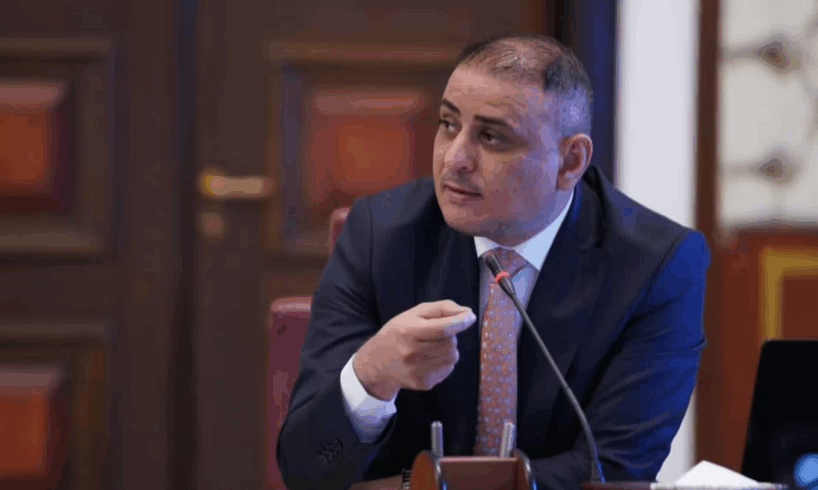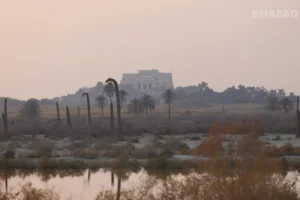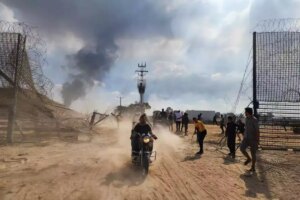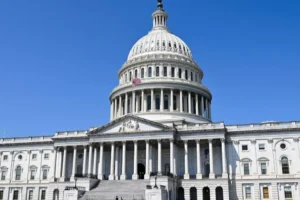
2025-07-20T17:49:22+00:00
font
Enable Reading Mode
A-
A
A+
Shafaq News – Wasit
A devastating fire at a hypermarket in Iraq’s Kut province claimed the
lives of at least 70 people, including men, women, and children, overnight
between July 16 and 17.
The tragedy has renewed urgent scrutiny over the widespread use of
flammable cladding materials in Iraq’s commercial buildings, as well as exposed
longstanding failures in regulatory oversight and emergency preparedness.
In the aftermath of the catastrophe, Iraq’s leading political blocs
agreed to push for the dismissal of Wasit Governor Ali Hassan Slemon, a
political source confirmed to Shafaq News. Leading parties have authorized
their lawmakers to back the governor’s removal if a parliamentary consensus is
reached.
Lawmaker Mukhtar al-Mousawi urged the Wasit Provincial Council to act
swiftly, stating, “Members who elected the governor should now vote to dismiss
him and refer the decision to parliament for ratification.” He further added,
“It was the Prime Minister’s responsibility to remove Slemon after a tragedy
that killed and injured dozens of innocent people.”
Alongside this political pressure, the Wasit Provincial Council
dismissed four senior officials implicated in the incident, including the
provincial police chief, civil defense director, head of health inspection, and
residency office director.
The tragedy also prompted a nationwide crackdown by Iraq’s Civil Defense
Directorate, which ordered the closure of 1,118 projects across the country
within 48 hours for violating fire safety regulations.
Hazardous Materials
Experts have long warned that flammable construction materials commonly
used in Iraq’s modern commercial buildings are a critical factor behind the
rapid spread of fires and the high number of casualties.
Abbas Khalil, a specialist in construction and urban planning, explained
to Shafaq News that “most markets and commercial buildings in Iraq have become
heavily reliant on hazardous cladding materials, both on their exterior facades
and in interior designs.” These materials are “highly combustible and cause
flames to spread in a matter of minutes.”
Among the most widely used is aluminum composite paneling, often
referred to as cladding. “Although it appears safe, it contains plastic cores
that ignite easily despite their thin metal coating,” Khalil said.
Additionally, foam panels and polyurethane—though intended as
insulation—turn into highly flammable fuel when exposed to heat. Polyvinyl
chloride (PVC) panels are also commonly used in secondary ceilings, while
medium-density fiberboard (MDF) is frequently found in interior walls and
furniture. Both materials offer minimal resistance to fire.
“These materials share a common and deadly trait: they accelerate fire
spread and release toxic gases that rapidly increase casualties,” Khalil
emphasized.
He also attributed the ongoing use of these materials not only to their
lower cost and ease of installation but also to the lack of effective
oversight. “Developers often choose the cheapest options without regard for the
consequences,” he added, stressing that once a fire ignites, containment
becomes an immense challenge.
Market Realities
A building materials vendor in Kirkuk, speaking on condition of
anonymity, confirmed that safety concerns are often overlooked in Iraq’s
construction sector. “Many owners of commercial and residential buildings favor
flammable materials because they are cheaper, faster to install, and enhance
aesthetics,” he revealed.
“When we caution them about the risks, their common response is
‘Everyone uses them,’ as if a disaster must strike before they reconsider.”
Construction safety expert Hassan Hadi underscored that the technical
solutions to the problem are well established; the primary barrier remains the
absence of political and regulatory will.
“We must implement strict bans on importing and using flammable
materials in all commercial and residential buildings,” Hadi urged.
He also highlighted the need for strengthened supervision of contractors
and mandatory installation of modern fire detection and suppression systems in
all public buildings. “New projects should be rigorously inspected, and
materials must receive certified approval prior to use.”
Hadi further advocated revising legislation to empower authorities, to
impose heavy fines or even to close non-compliant projects before disasters
occur, emphasizing that raising public awareness is critical to ensure safety.





